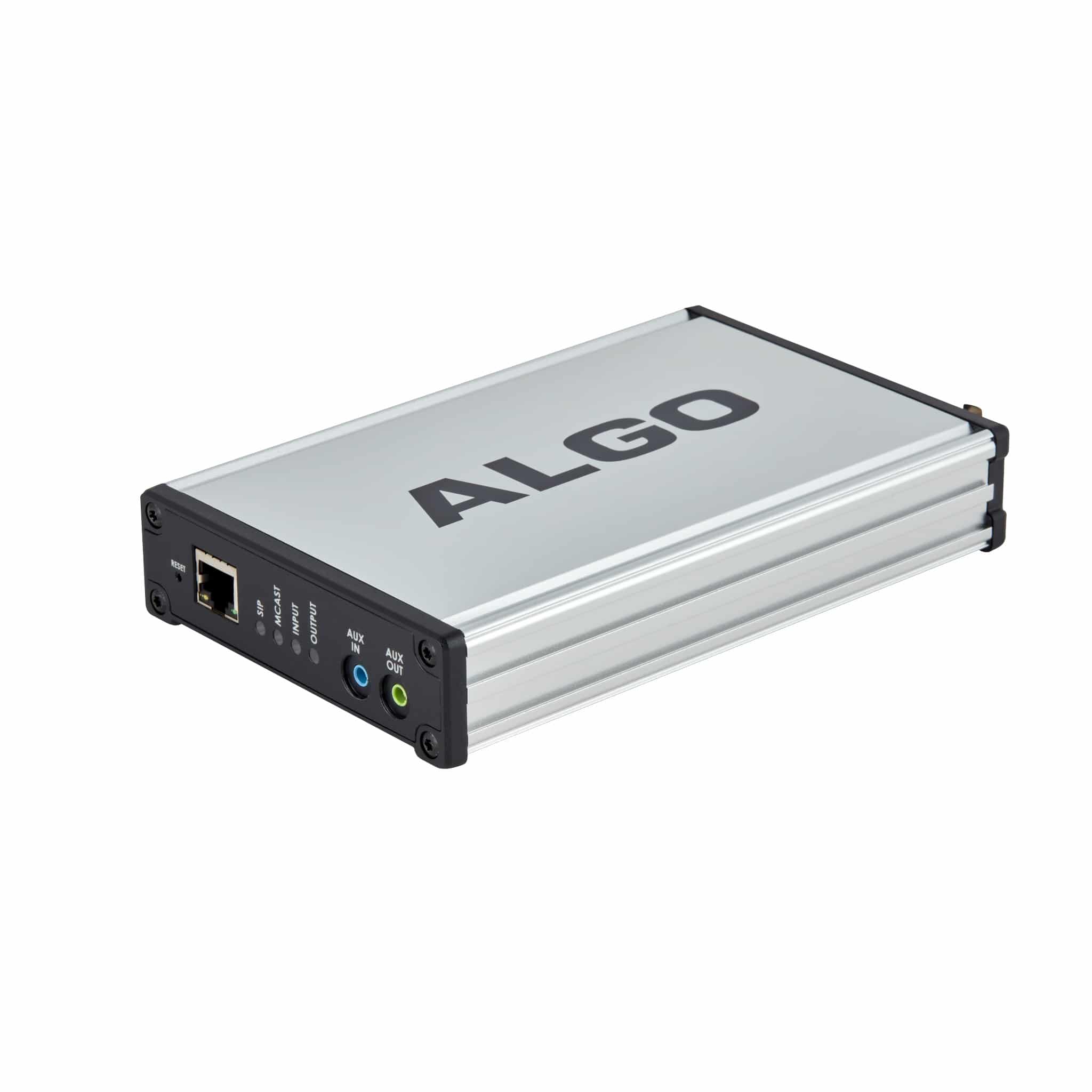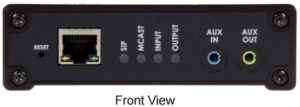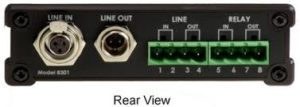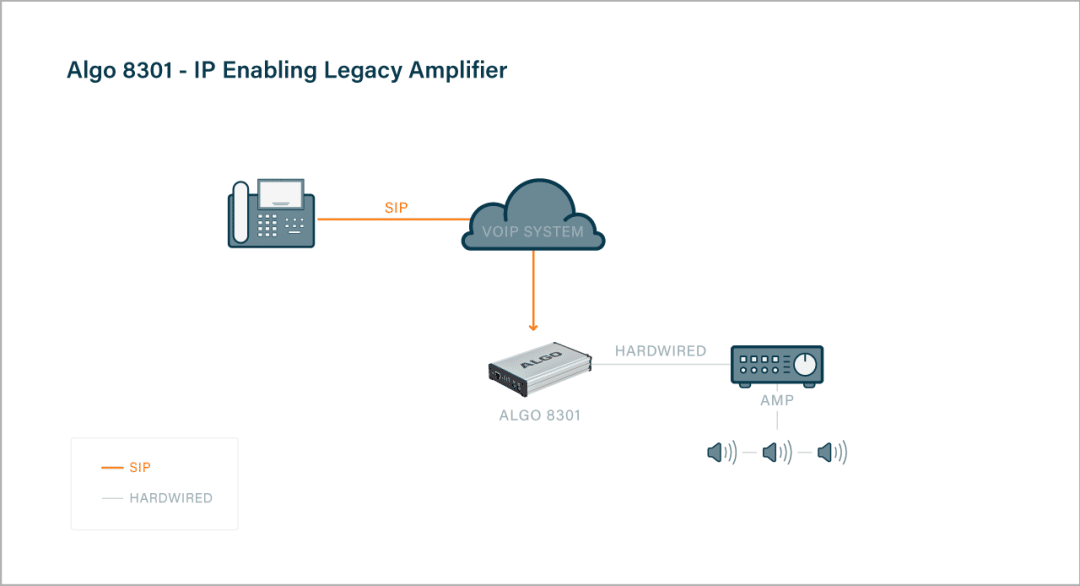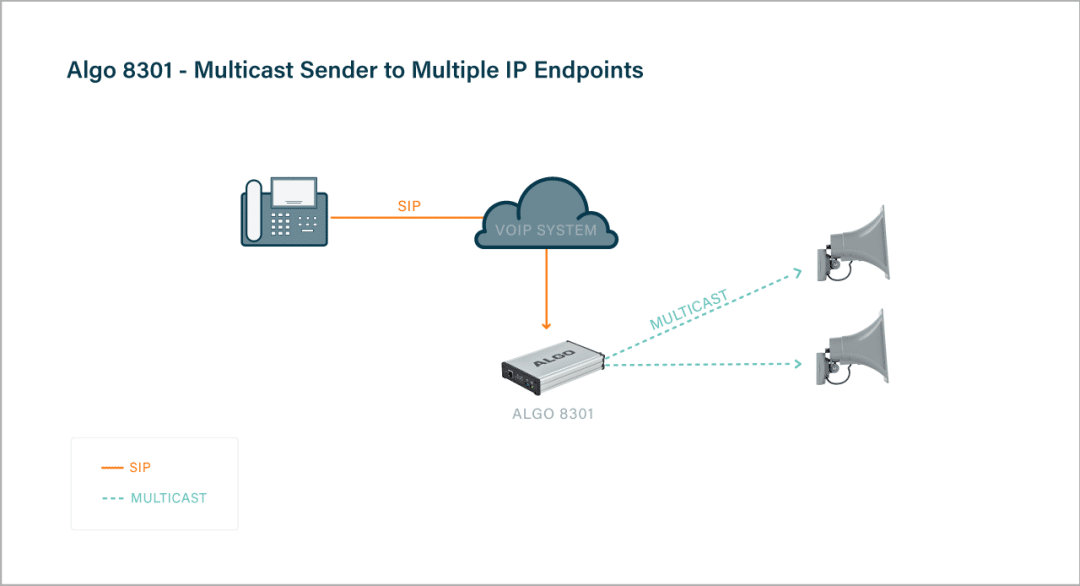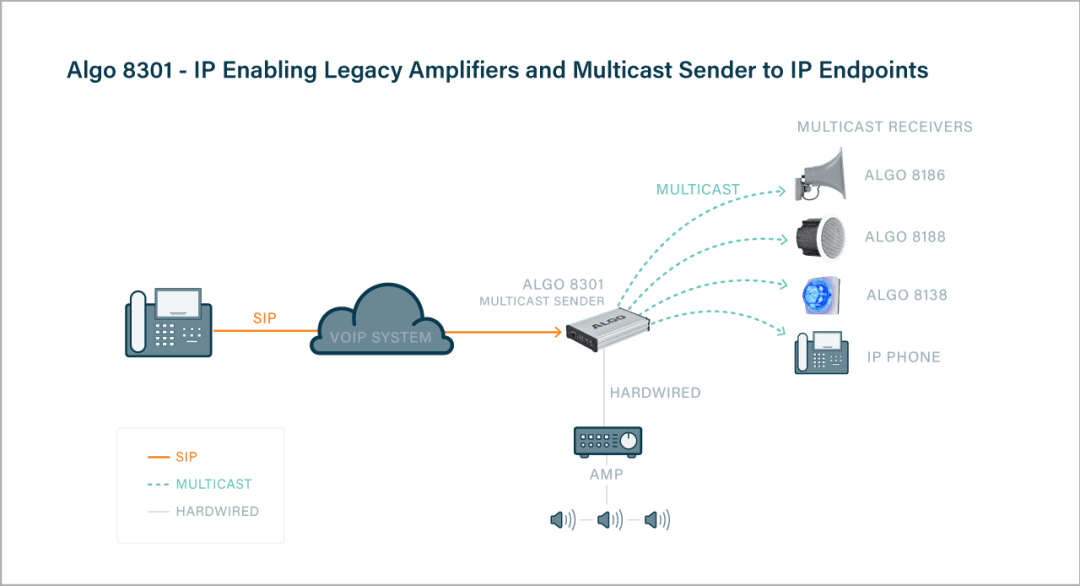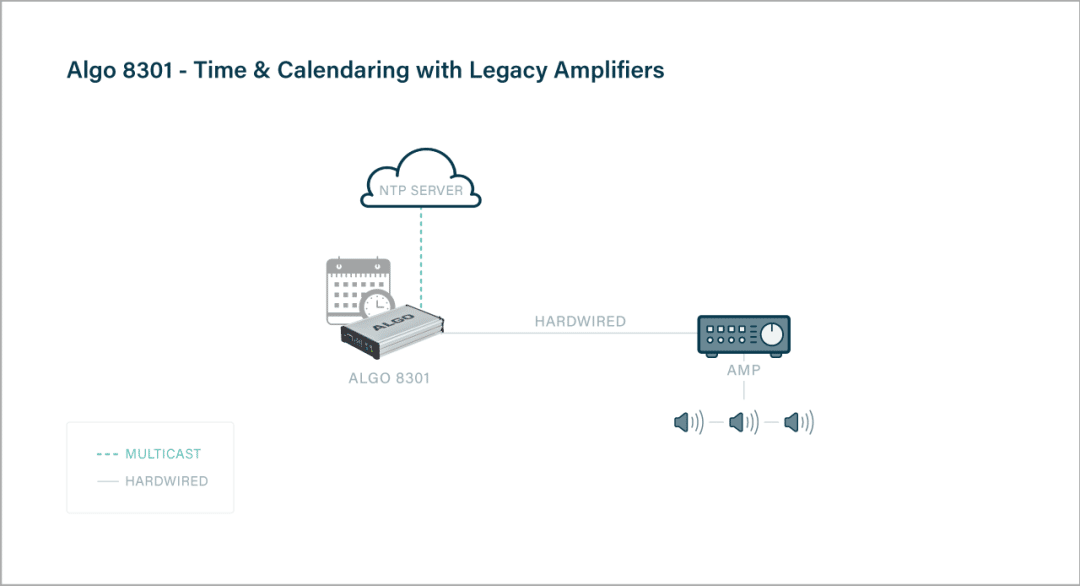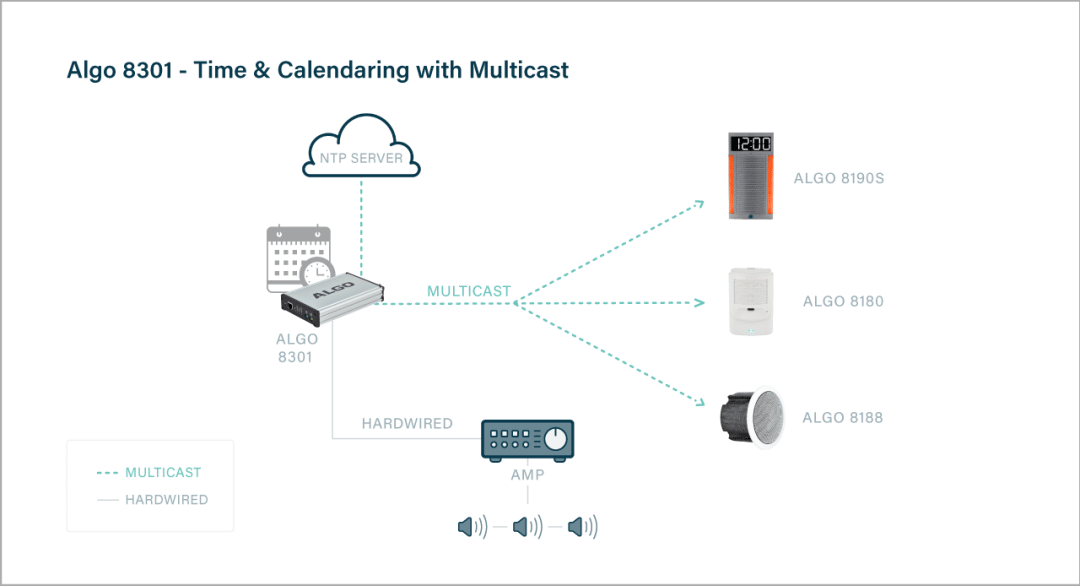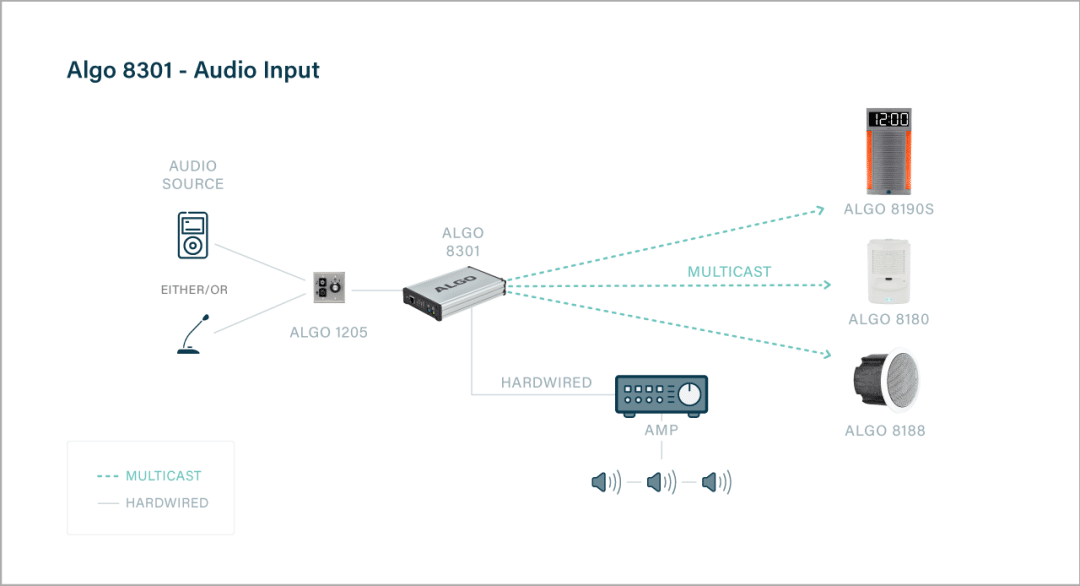8301 IP Paging Adapter & Scheduler
Wideband IP Paging Adapter & Bell Scheduler for Integrating Legacy Analog Amplifiers
The PoE 8301 IP paging adapter provides a dry page output to a traditional amplifier, thereby offering a seamless bridge from VoIP to a legacy analog voice paging / public address (PA) system. The device also functions as a scheduler for automated bells, tones, and announcements. A contact closure and music input also feature on the 8301.
The paging adapter is a fully compliant 3rd party SIP endpoint. As a result, the 8301 IP paging adapter is compatible with most hosted / cloud and premise-based VoIP telephone systems.
The 8301 SIP Paging Adapter and Scheduler is UL/CSA, FCC and CE certified. The paging adapter includes brackets for wall mounting and is a PoE device.
Data Sheet
User Guide
Product Overview
Product Demonstration
Product Introduction
Description
The 8301 SIP Paging Adapter and Scheduler is designed to bridge a VoIP telephone system to a traditional analog amplifier / public address (PA) system. The endpoint is powered via PoE (IEEE 802.3af). Wall mount brackets are included for easy installation. The product is CSA/UL, FCC and CE certified.
Seamless IP Interface to Analog PA Systems
The 8301 IP paging adapter emulates a page port, similar to what is found on a legacy PBX or key system. The adapter connects directly to a traditional analog amplifier, thereby offering a simple and easy interface to a VoIP phone system as a SIP extension and multicast endpoint.
Wideband G.722 HD voice codec is supported in the 8301. Consequently, there is high intelligibility and clarity of audio from the paging adapter for IP paging of voice announcements and emergency notification. The isolated and balanced line output of the 8301 ensures there is no hum or noise.
The line output of the 8301 IP paging adapter provides a dry audio output for any amplifier with input impedance between 600 Ohm and 10 kOhm, where the line output of the paging adapter can be defined to match the input specification of the amplifier. This means most amplifiers are supported by the 8301. Either XLR connector or terminal block is available from the 8301 for easy connection to an amplifier. A dry contact closure to activate the amplifier is also available, if required.
No ATA Required
For amplifiers connected to an FXS port or ATA through a ‘telephone answering device’, the 8301 IP paging adapter will replace the answering device and eliminate the need for an FXS port or analog terminal adapter (ATA). Note: The 8301 does not provide an FXS port.
The 8301 paging adapter is only recommended to connect to a single amplifier. Where multiple amplifiers are used, one paging adapter is bridged to each amplifier. Multicast can be configured to stream audio to individual amplifiers or to any combination as required (e.g., all call page zone).
An audio input on the 8301 IP paging adapter is isolated and balanced to prevent equipment ground loops where the adapter is used for auxiliary input or insertion between existing equipment. This allows IP based paging or emergency notification to take control of the amplifier as necessary.
Legacy Zone Controller
Where a legacy amplifier has a zone controller connected for page zones selected using DTMF key press from a telephone keypad, the 8301 can be configured to pass such tones through its audio output. Alternatively, the legacy zone controller can be replaced and the 8373 IP Zone Paging Adapter can be used to bridge the IP telephone system to the legacy amplifier.
Multi-Application SIP Extensions
Multiple SIP registrations are available in this IP endpoint, including Page (50), Emergency Alert (10) and Ring (10) extensions. On Page, the paging adapter will auto-answer when called for making public address (PA) voice announcements. For Ring and Emergency Alert extensions the paging adapter will play a configurable WAV file from 1GB device memory (e.g., ring tones for telephone alerting, notification alerts for safety / security / emergency events and informational announcements) when the extension is called.
Scale Algo IP Paging Speakers Over Any Size Building or Campus
The 8301 IP paging adapter supports multicast send or receive. A single registered paging adapter can be configured to multicast to any number and mix of Algo IP speakers, strobe lights, paging adapters and multicast supported IP telephones. As a result, a solution can be deployed to cover any size building, campus (e.g., classrooms in a school, college or university) or enterprise. There is no limit to the number of devices part of a multicast, and a minimum of network traffic activity is utilized.
Multicast provides cost-effective scalability using a minimum of SIP registered endpoints, as only the endpoint designated to send the multicast needs to be registered. Devices configured to receive the multicast do not need registration.
In a hybrid model, the 8301, when receiving a SIP call, can simultaneously activate a legacy amplifier and initiate a multicast stream to activate IP phones, intercoms, speakers, and visual alerters. It delivers audible communication concomitantly across legacy and IP devices.
Support is available for RTP multicast, in addition to Polycom Group Page, Singlewire InformaCast (part no. 8301-IC) and Syn-Apps Revolution.
Multicast Zone Paging
Multicast zone paging for up to 50 zones can be configured from a single 8301 adapter. Zones can be selected one of two ways. One option is to map multicast page zones to individual SIP extensions on the adapter. Fifty (50) page extensions are available for this purpose. Alternatively, in order to minimize SIP registrations, multicast page zones can be configured in the paging adapter as a DTMF key press selection using the dial pad of telephone making the page call.
Note: Additional page zones can be configured by registering individual Algo IP speakers for specific room paging (e.g. school classroom). Speakers with SIP registrations can also be configured to be a member / receiver of multicast zones.
Bell Scheduler for Schools, Shift Changes, Retail Announcements & Other PA Applications
The 8301 also features a scheduler for automating the playing of WAV file tones, bells, announcements, etc. The scheduler uses the NTP server to synchronize with IP clocks, such as the Algo 8190S IP Speaker Clock, and is ideal for schools (i.e., class changes, recess, playing an anthem, etc.), retail and healthcare announcements (e.g., store closing, visiting hours, etc.), and workplace shift changes, breaks, etc. Audio is available to be played via the 8301 line out and/or as a multicast. No SIP registration is required for configuring the scheduler. A separate log in from the primary 8301 web GUI is available specifically for configuring the scheduler.
The 8301 contains an embedded calendaring feature, which can sync its local with a NTP server to ensure it’s always correct. This calendaring feature can initiate pre-recorded announcements (e.g. pre-recorded voice announcements, bells, or chimes on schedules), activating legacy amplifiers and/or IP speakers. Custom WAV or MP3 audio files can be uploaded to the 8301, which offers 1GB of local storage.
Emergency Notification Alerting
For notification alerting of safety, security and emergency events there are two activation options available: Dial an Emergency Alert extension or connect a button to the speaker’s relay input.
Up to 10 Emergency Alert extensions are available to register on the 8301 IP paging adapter, allowing for different types of alerts to be activated when the extension is called (e.g., lockdown, evacuation, shelter, all clear, etc.). Custom WAV files can be uploaded to 1GB of device memory. A Call To Cancel feature is available to allow the emergency alert to play continuously for as long as desired until canceled. Alternatively, the WAV file alert can be configured to play for a pre-set duration. The user does not have to remain on the phone when calling the Emergency Alert extension. As soon as the call is made the Algo endpoint will play the WAV file as configured, making emergency alerting simple and efficient from any telephone or device in the UC environment. If the Call to Cancel extension is configured, the same canceling extension will apply to any of the Emergency Alert extensions registered.
As an alternative option for emergency alerting, any button or accessory providing a contact closure, including the Algo 1202 and 1203 buttons, can be wired to the 8301 relay input using a 24 gauge single twisted pair. Three configuration options are available via speaker’s relay input upon button activation:
- Play and/or multicast an alert.
- Call a target extension and play a discrete WAV.
- Call a target extension and have a two-way call using a headset with microphone connected to the 8301.
Any combination and number of Algo IP endpoints can be configured as a multicast for emergency alerting to cover any size room, building, campus or enterprise.
Music Input
A 3.5mm aux input is available on the 8301 for connecting a music source. Background music can be played via the 8301 line output and streamed as a multicast at the same time, if desired. A call to any of the 8301 registered extensions will interrupt music, as will a scheduled event. Music will resume playing once the call or scheduled event concludes.
The 8301 can also be activated by an audio input, either a microphone or audio source, played over a legacy amplifier or any IP device via multicast. The optional 1205 Audio Interface provides a simple and reliable method for connecting either audio source to the 8301. The rotary control knob has three positions for music, microphone, and off. The 1205 provides peace of mind by allowing any user to plug a source into it without handling the 8301 directly. Note: the 1205 is not required for music streaming, but it is required to connect a microphone.
Benefits of the PoE Algo SIP Paging Adapter & Scheduler
- Excellent Wideband audio clarity and intelligibility with direct connectivity to an amplifier for a seamless VoIP integration.
- Network managed and supervised SIP and multicast endpoint.
- Fully zone configurable via a web interface.
- PoE (IEEE 802.3af) eliminates need for local power supply and simplifies wiring infrastructure and management.
- Eliminates narrowband FXS port or ATA and telephone answering device hardware.
- Easy and intuitive web interface to configure scheduled announcements, tones, bells, etc., with a separate log in for user convenience.
- Synchronization of scheduler and IP clocks using NTP server for ease of management.
- Network appliance with no dependency on software or PC for bell scheduling.
- Easily combine with other Algo IP endpoints for a comprehensive public address (PA) system to support voice paging, emergency alerting, night bell / loud ringing, bell scheduler and playing music.


